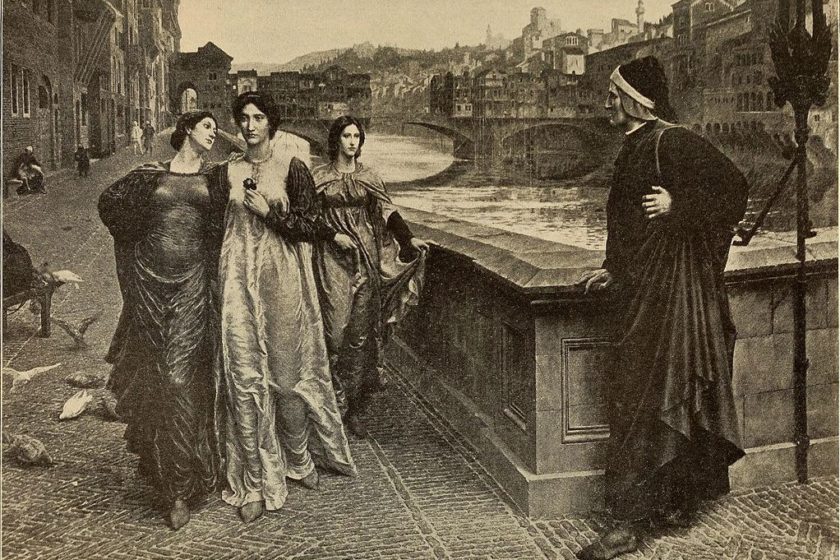What was Dante Alighieri’s idea of love? J. L. Borges talks about it in his essays, and provides splendid insights in the work of the greatest poet who ever lived: the man capable of imagining a love beyond eternity.
J. L. Borges was a great admirer of Dante Alighieri’s masterpiece the Divine Comedy, and he didn’t make a mystery of it: “the Comedy” he said, “is a book we must all read. Not to do it means to deprive ourselves of the greatest gift literature has to offer, it means to condemn ourselves to a weird asceticism.” Apparently, the Comedy was such an important book to Borges that it remained open on his desk for all his life, to be read over and over. He also wrote about it, analyzed it, provided his point of view. I got a booklet with nine short essays about the Comedy written by Borges, all tackling some specific parts of Dante’s poem, all inspiring. So inspiring in fact that made me want to go back and read, if not all, at least part of the Divine Comedy again.
It is no easy reading the Comedy, especially in Dante’s 14th century Italian, but with patience, it is extremely rewarding. First of all, there’s a lot of suspense in it, it is masterfully written as an adventure. I mean, it tells about the journey of a human being through Hell, Purgatory, and Heaven, per se not the regular Lost Temple kind of setting. Furthermore, it does so in the first person, as if the poet himself was really there, looking at infinite spaces, surrounded by damned souls, demons, mythological beasts, saints… I would think one could get scared once or twice, and Dante does get scared, very much so: he is so very human in that inhuman world.
Then there are the verses, all rigorous hendecasyllables organised in tercets, and rhyming of course. The beauty of the Comedy’s verses is unparalleled, and I am not talking about aesthetics only. I always found the most striking feature of Dante’s writing his unique capacity to capture the very essence of human experience, emotions, and existence, in a handful of lines. Stuff anyone else would need an entire essay to treat, a book, he did with a beautiful and powerful simplicity, often drawing from the imagery of peasants and common people, as opposed to nobles who, at that time, used to read in Latin. The Comedy is written in a vulgar language, a common language that anyone could read it, and still the verses are so meaningful. When, while reading, I realise this, I always feel a thrill of astonishment and excitement in my head.
One of the emotions Dante captures in the Comedy is of course love, certainly one of the most powerful, perhaps the hardest to write about, yet likely the most tackled in the history of literature. Borges analyses in his essays two passages of the Comedy, both about love. The first is when Dante meets Beatrice in Heaven on Earth, right above the Purgatory. The second is the well-known fifth Canto of Hell, describing the punishment of the two lovers Paolo and Francesca. On both these passages have been written encyclopedias, it isn’t my intention to go through everything here. I just want to go through Borges points, as I believe they help to understand Dante’s idea of love as a person, as opposed to the Poet.
Dante imposed to himself a great rigour when writing the Comedy, to be coherent with a certain Catholic vision of life and death. In the meantime, he was incredibly human and capable of describing, probably aspiring, to the greatest idea of love, the one that is never-ending. I’ll try to provide a short background on the two passages as I go on.
Beatrice was a real person and Dante’s muse. Long story short, Dante was in love with the woman but she was not with him. She actually mocked him publicly, ended up marrying a banker, and died at the age of 25. Dante seldom saw Beatrice, barely knew her, but he loved her all his life, even though he married and had children with another woman. As Borges puts it “To Dante, Beatrice existed infinitely, while to Beatrice, Dante existed very little, perhaps not at all.” Despite so, Dante puts Beatrice in Heaven, not only, he puts her right on the side of the Virgin Mary, kind of an important spot, only because he loved her, as the girl did nothing special to actually deserve it. When, during his fictional journey, he finally arrives at the end of Purgatory and he is about to enter Heaven, Beatrice appears before him to become his guide.
That is the scene that Borges focuses on, when the two meet, in the 30th Canto of Purgatory, in Heavens on Earth, described as the place where people find happiness. Beatrice a death soul, Dante still alive although in the after-world. Poetic muse, ideal love, a guide through Heaven, and light that leads to God, Beatrice’s appearance is described with the powerful imagery of a goddess on a chariot, descending, in an act of incomparable benevolence, towards his devotee. But she is not a warm and loving presence. On the contrary, she is cold, and severe, detached from human emotions. She scolds Dante and asks him to repent for his sins before he could continue on his journey.
Just like in real life, Dante does not get Beatrice’s love, not the warm, kind, passionate type of love human beings long for. In a way, she cares about him (and that’s already in Dante’s imagination), but rather about the salvation of his soul than him as a person. She is there to guide him, a distant angel with a blissful smile. But even if he finally manages to see her again, many years after her death, even if he still stares at her with the blind admiration of a man in love, that love, the emotion he has so longed for, is denied to his beating heart. Dante does try to hide his deception in the Canto. The Poet knows that’s how it is supposed to be, that human love is not for that place and time, and that he is not there to find such Earth-like sentiments, that’s not his mission, that’s not why he is granted passage through the three realms. But how about the Dante person?
Borges feels it, he feels Dante’s desperate love for Beatrice, and elegantly describes it with these words: “to fall in love is to create a religion with a fallible God.” When we feel something as powerful as love, and we start idolizing the loved one, it’s like creating our own religion. But unlike religions, which are dogmatic by definition, based on faith, this is a doctrine with many flaws, starting with the simple fact that we are in love with another person. Imagine to be refused by your own God, all you believe in, mocked and ignored by it, and nevertheless still be desperately, inevitably in love with it, with her. The painful, impossible love Dante felt towards Beatrice is what made him the greatest poet who ever lived.
What was then Dante’s idea of love? Another passage of the Comedy might come in handy here, the one describing the tragic end of Paolo and Francesca. Also real people, the two lovers were assassinated by Paolo’s brother, also Francesca’s husband, when caught in the act of betrayal. In those times things like that weren’t taken very lightly. Not that today they are taken much more lightly, but at least in the majority of cases people don’t kill for jealousy, if anything they call a lawyer to satisfy their thirst for vengeance.
Anyways, Dante places them in the Second Circle of Hell, reserved to those overcome by Lust. Here the damned souls float endlessly in the air (as in life they gave up to carnal desires), caught in strong whirlwinds and violent storms. The peculiarity of this case is that these two souls float together as one. That’s what catches Dante’s attention, and makes him wish to speak to them. So much has been written about this Canto, perhaps the most famous of the whole poem, but Borges indulges on a particular point, which has to do with the difference between condemning and understanding.
Dante condemns Paolo and Francesca, they committed adultery, and therefore, in his Catholic view, they need the right punishment (the man who killed them is of course in a deeper part of Hell, suffering a worse punishment). At the same time, Dante feels enormous compassion and emotion for their story. Dante asks the two lovers what happened, how it could happen. He wants to know about that love, about that passion, he wants to understand it, he wants to feel it.
The only one speaking is actually Francesca, a damned soul, a woman condemned to remain in Hell for eternity, talking about love. She sadly, desperately recalls the actions that cast upon her eternal punishment and suffering, but on she goes telling about that fatal moment: they were reading together about Lancelot and Guinevere, she says, another immortal story of adultery… but here is the passage in her own words, original and paraphrased in English:
133
Quando leggemmo il disiato riso
esser baciato da cotanto amante,
questi, che mai da me non fia diviso,
la bocca mi baciò tutto tremante.
When we read of the much longed for smile
Being kissed by such a noble lover,
This one, who never from me shall be divided,
Kissed me upon the mouth all trembling.
There’s everything in this passage. There’s the strength of uncontrollable desire; there’s the power of overwhelming passion; there’s the fear of the first kiss; there’s love, inevitable, unfathomable, unbreakable love. Francesca’s love for Paolo is so strong, so passionate, so true, that even in Hell, even punished and damned for eternity, even aware of the sin they perpetrated, she states without hesitation that never he shall be separated from her. While she pronounces these words, Paolo, who has been on her side for the whole time, in silence, cries. And in that moment, subdued by such a strong, perhaps unexpected feeling, for the first and last time in the whole journey through the after-world, Dante faints and falls on the floor, in his own words “like a dead body falls”.
Well now, this is some love, and some reaction by the great poet. Borges quotes Madame de Stael here: “To understand everything is to forgive everything.” That is to say that an unlawful act, a sin in this case, can be punished, but if the circumstances are understood, it can also be forgiven. He goes on highlighting that in reality there are no sinners, but only individuals that the inadequacy of the human language categorizes as such. So, the poet Dante Alighieri couldn’t but place those individuals in the second Circle of Hell, but the man understood, and forgave, hence the compassion, and the emotion. On the other hand, if all of that would be happening today, as wrong as it may be for some people, who would blame Paolo and Francesca, who acted out of love, out of something they couldn’t control?
Dante couldn’t handle all that emotion, while in the rest of the journey he manages, although sometimes barely, to handle demons and beasts, dangers and impossible infernal scenarios. That’s how important love was for the man, for the human being, although not for the Poet. Perhaps this was Dante’s idea of love after all: the love he longed for but could never get from Beatrice, not even in the fiction of his great journey. He could not completely separate the coldness Beatrice reserved to him in real life, even though she remained his muse, from the Beatrice he met in Heaven, even though she became his guide. She remained a distant being to him, unreachable, concerned about his salvation but not about his emotions and desires.
Love, real love Dante could only dream of, and the best way he had to let it out, to tell the whole world about it, was to represent it through the hellish story of two sinful lovers, who tragically died in each other arms. That’s where the Poet gave up to the person, to compassion, to understanding. From his deepest self, he used all the tools at his disposal to create one of the most powerful love stories in the history of literature. A love that could endure the passing of time, and reach beyond eternity.








Well written Paolo thank you.
I’m also a big fan of Borges and through him discovered Beatrice and Paolo and Francesca in Dante’s poem.
Best regards.
Thanks Robert! I am glad you enjoyed it 🙂
This doesn’t seem to convey at all the intent of Dante. Saying that Dante had these strong desires is not the same thing as Dante saying that they ought to be put on a pedestal. You also left out the whole passage of Virgil explaining why he should not sympathize with the damned, and the later passages of Dante overcoming this fault in himself. Dante’s journey is one of realizing that these base and beastial passions are nothing compared to “the Love that moves the sun and other stars.” Even his life biography shows this well—how he went from a licentious man to an ascetic, a member of the third order of St. Francis, dedicating himself to the love of God and a solitary life. Please do more justice to the man and his work.
Hi Henry, thank you for your input. As you may have read in the post, it was not my intention to go through the whole of Dante’s journey, but only through some of Borges’ essays points, more specifically the ones mentioning love. The title of the post doesn’t leave much room for misunderstanding I believe.
It goes without saying that there is much more to Dante’s work and life, too much in fact, and much of it still open to debate and interpretation.
I would invite you to read Borges essays if that interests you, they are inspiring. At least they have inspired me, and I have loved his point of view, which I believe does pay more than justice to the man, and his work.